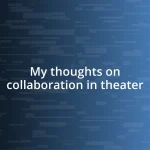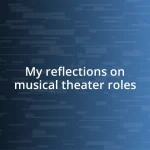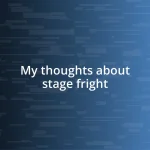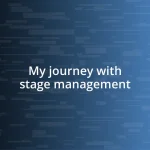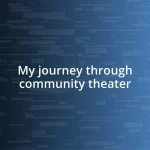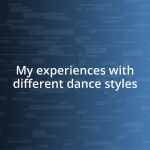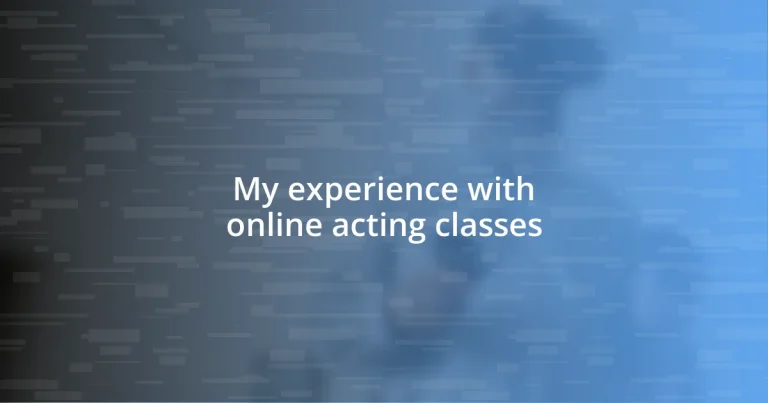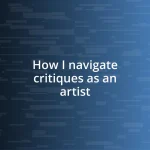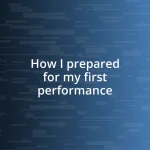Key takeaways:
- Initial passion for acting sparked during high school, focusing on character embodiment and emotional storytelling.
- Choosing the right online acting class involves considering class type, instructor background, and class size for personalized experience.
- Challenges in online acting classes include technical issues, self-discipline, and the impact of delivering feedback through a virtual medium.
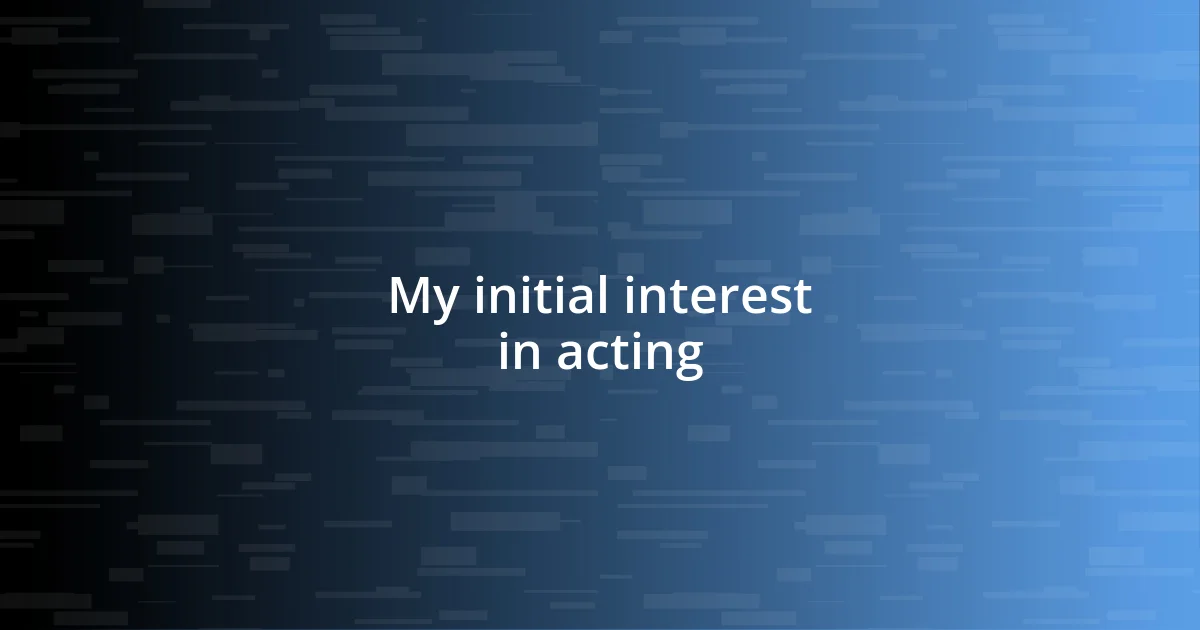
My initial interest in acting
Acting always intrigued me, but the spark ignited during high school when I participated in a local theatre production. The moment I stepped onto the stage and felt the lights warm my face, something clicked inside me. Have you ever felt that rush of adrenaline? It’s both terrifying and exhilarating, and that blend of emotions drew me in deeper.
For me, the magic of embodying different characters was irresistible. I remember rehearsing lines in front of my mirror, becoming a fierce warrior one moment and a whimsical fairy the next. It was liberating to escape reality, even for a short time, and I often wondered: What if I could share that experience with others? That question propelled me to explore acting further.
Reflecting on that early passion, I realize it wasn’t just about performing; it was about connecting with people. I longed to tell stories that resonated with emotions, to elicit laughter or tears. Can you envision a moment in your life where you just wanted your voice to be heard? That’s what ignited my journey into the world of acting.
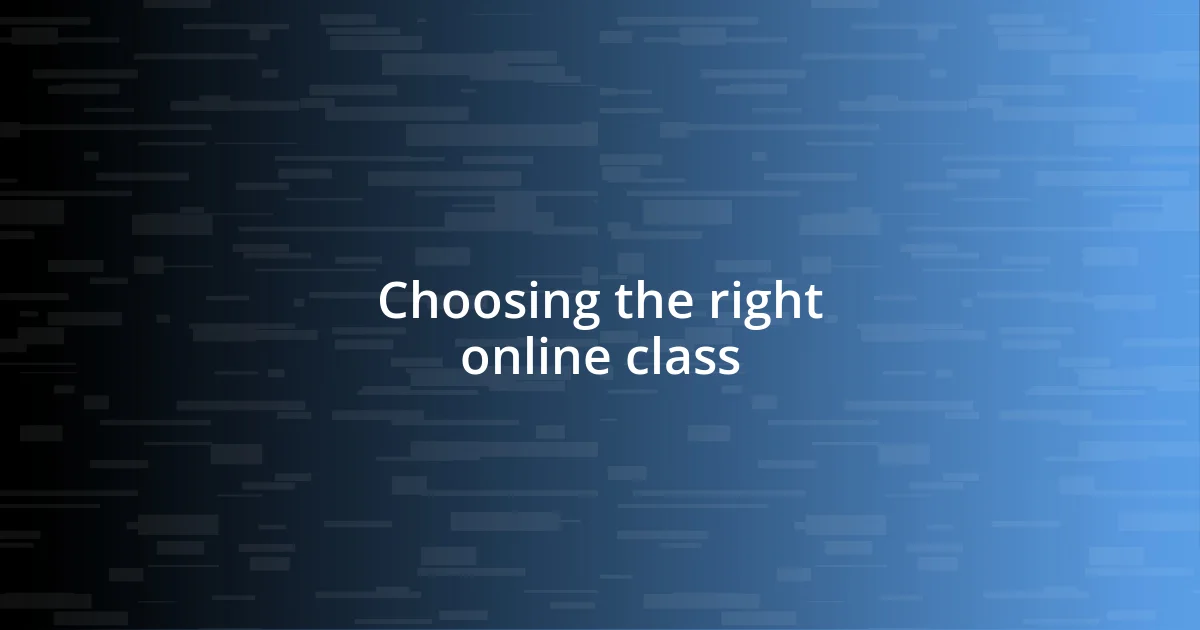
Choosing the right online class
Finding the right online acting class can feel overwhelming, but it’s crucial to align the course with your goals. When I first searched for classes, I was unsure whether I should focus on improvisation, scene study, or even voice training. Each type brings unique skills and experiences, so consider what resonates with you. What skills do you want to develop?
As I navigated my options, I realized the importance of instructors. I once enrolled in a class led by a former Broadway actor, and it changed everything for me. The way they shared their experiences made lessons come alive. I recommend checking instructors’ backgrounds and their teaching styles before committing.
Another key factor is class size. Smaller classes can offer more personalized feedback, which I found invaluable during my learning process. In contrast, larger classes might expose you to a broader range of perspectives. It’s essential to ask yourself: Do you prefer one-on-one attention or a diverse collaborative environment? Taking the time to evaluate these aspects will help you select a class that truly fits your journey.
| Factor | Considerations |
|---|---|
| Class Type | Focus on skills like improvisation or voice training. |
| Instructor’s Background | Look for industry experience and teaching style. |
| Class Size | Small classes offer personalized feedback; larger classes offer diverse perspectives. |
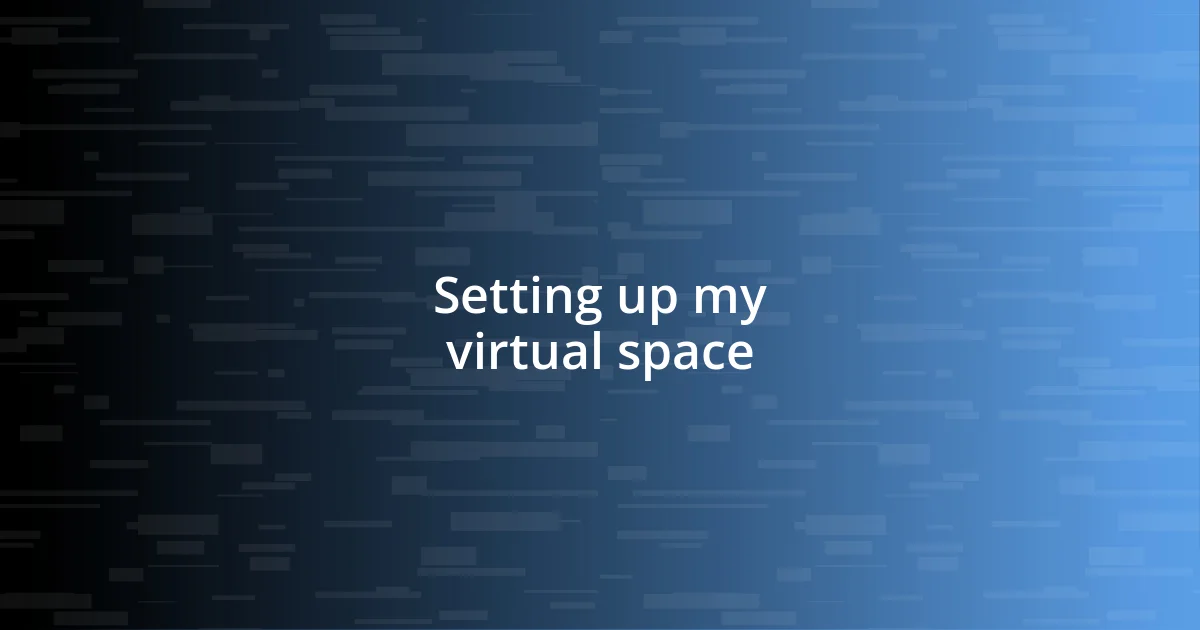
Setting up my virtual space
Setting up my virtual space was an experience filled with excitement and a hint of anxiety. I remember clearing my small living room in preparation for my first online class. It felt like transforming my ordinary home into a stage, and I wanted to create an environment that fostered creativity and focus. The importance of lighting and background became clear to me as I experimented with different setups. A well-placed lamp made my space feel warm and inviting, helping me tap into my emotions during performances.
To enhance my virtual environment, I focused on the following elements:
- Background: I chose a clean, uncluttered background to keep the focus on me. I hung a few framed posters of my favorite plays for a touch of inspiration.
- Lighting: Soft, diffused lighting was essential; I used a ring light to ensure my expressions were clearly visible.
- Sound Quality: I invested in a good microphone to capture my voice clearly, which was essential for delivering lines effectively.
- Dress Code: Wearing my acting attire, even at home, helped shift my mindset into performance mode and made the experience feel more authentic.
Creating that virtual space not only improved my technical setup but also transformed my mindset. I felt more connected to the craft, ready to dive into the world of acting from the comfort of my home.
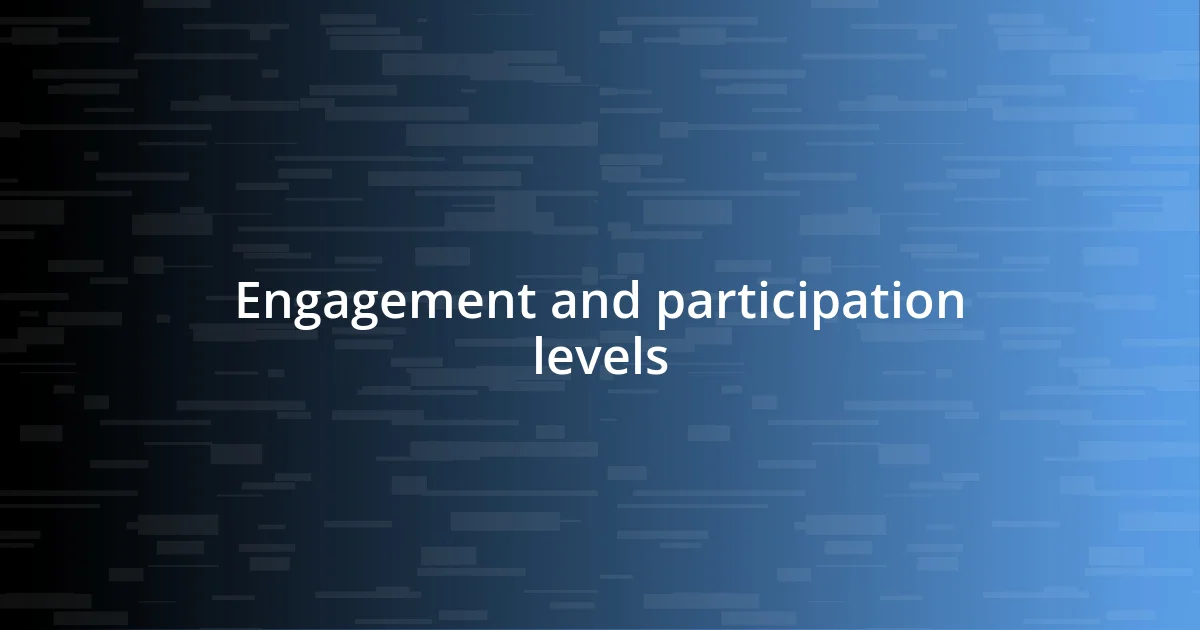
Engagement and participation levels
Engagement in online acting classes can be a balancing act. I’ve found that my participation level significantly depended on how interactive the platform was. For instance, during a class where we used breakout rooms for scene work, I felt a rush of excitement. It was as if I was thrust into an on-stage moment, and suddenly, the screen felt less like a barrier and more like a spotlight.
Reflecting on my experiences, I’ve noticed that the instructor’s approach dramatically influences class engagement. One of my favorite teachers often incorporated improvisation exercises that felt like playful games. This not only sparked my interest but also made it easier to shake off nerves. I remember when we were asked to create spontaneous characters; I lost track of time and simply enjoyed the process. Isn’t it fascinating how active participation shifts your mindset from learning to performing?
Lastly, I believe peer interactions play a pivotal role. It was inspiring to connect with other students who shared my passion. We often cheered each other on during live sessions, creating a supportive atmosphere that I craved. I vividly remember a fellow classmate delivering a monologue and the thrill of everyone’s applause over the video call. What a delightful reminder that despite the physical distance, we were all there, sharing in the art of performance together.
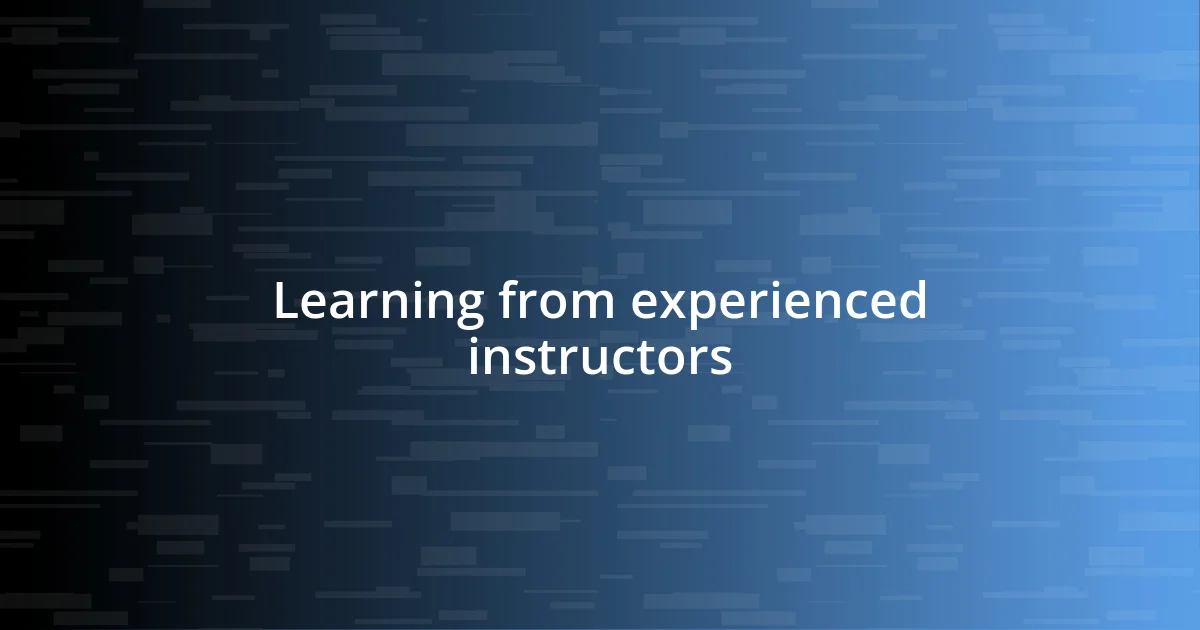
Learning from experienced instructors
Learning from experienced instructors added a whole new dimension to my online acting journey. I vividly recall my first class with an acclaimed coach who had an impressive background in theater. As she shared her expertise, her passion for the craft radiated through the screen. I couldn’t help but feel inspired, and I realized that having a seasoned instructor can truly elevate your learning experience. Have you ever felt that spark when someone shares their deep love for their field? It’s contagious!
One particular lesson stands out to me. My instructor encouraged us to embody different emotions by recalling personal memories. This exercise felt both revealing and exhilarating. I remember digging deep into my past, pulling up a cherished moment, and using it to fuel my performance. The instructor’s guidance through this process showed me how the experiences and insights of someone experienced could illuminate aspects of acting I had overlooked. It’s amazing how intuitive techniques can unlock layers of emotion.
Moreover, the small group feedback sessions were invaluable. I often found myself reflecting on my classmates’ performances, thanks to the constructive criticism provided by our instructor. After one session, a peer mentioned how the instructor suggested we incorporate physicality into our scenes. I started experimenting with gestures and movements that felt authentic to my character. It’s fascinating how a single piece of advice can shift your approach. Have you experienced that moment where someone else’s insight just clicks for you? It’s these little breakthroughs that define the learning process, making it all worthwhile.
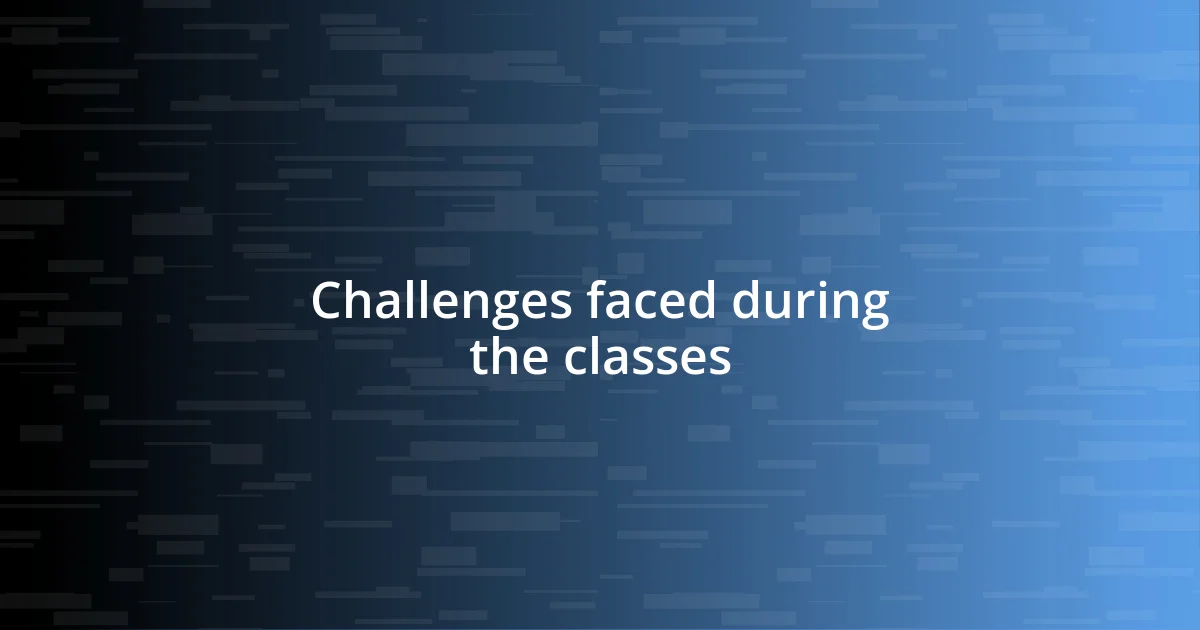
Challenges faced during the classes
The online format introduced unexpected challenges that sometimes felt overwhelming. I recall struggling with the technical aspects, especially when my audio failed during an important scene read. It’s frustrating when the tools designed to connect us instead create a barrier. Have you ever been in a situation where a simple glitch turned into a dramatic interruption? It can feel disheartening, but I realized adapting to these hiccups became part of the learning experience.
Another hurdle was the need for self-discipline and motivation. Without the typical classroom environment, I sometimes found it challenging to stay focused. There were days when the comfort of my home lured me into distractions – like scrolling through social media instead of preparing for my next performance. I had to remind myself why I began this journey in the first place. Do you ever catch yourself procrastinating in spaces where you’re supposed to thrive? I found that setting clear goals for each class helped me reclaim that focus.
Moreover, incorporating feedback from peers felt tricky in a virtual setting. While I appreciated the constructive critiques, delivering them over a screen sometimes dulled their impact. During one session, I gave a friend feedback on her emotional delivery, but I sensed a lack of connection that would have been present in person. Each glowing word felt stifled behind the camera. It makes me wonder how much more potent those interactions could be face-to-face. Despite the challenges, I learned that effective communication and support can transcend the screen, yet it demands extra effort on our part.
